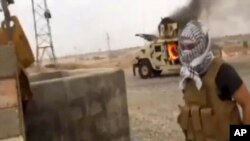ISTANBUL —
An Islamist militants' seizure of the Turkish consulate in the Iraqi city of Mosul is stoking concerns Ankara could intervene in the fast-spreading insurgency.
The radical Islamic group the Islamic State in Iraq and the Levant is holding 49 Turkish diplomats and family members, including children, captive. An ISIL spokesman told an Iraqi Kurdish news organization that no harm will come to the diplomats.
Turkish Foreign Minister Ahmet Davutoglu has warned of swift retaliation if the diplomats are harmed.
Justice Minister Bekir Bozdag says Turkey's government is considering whether it has sufficient legal powers to launch a military operation.
The issue of whether the existing mandate is sufficient for a military operation or a new mandate is required is among the issues being discussed, he said.
Cross-border military operations have to be sanctioned by the Turkish Parliament. Last year, the parliament gave the government the power to launch military operations against Kurdish rebel bases in neighboring Iraq, but the mandate expires in September.
Analyst Cengiz Aktar of the Istanbul Policy Center says Turkey may hold back.
"Turkey’s intervention could be justified by the hostage taking at the Mosul consulate. But whether Turkey will dare to intervene militarily, there is serious doubts," Aktar said.
Adding to pressure on the government is the fate of more than 30 Turkish truck drivers also being held by ISIL. Turkish media quoting one of the drivers as saying they are facing execution unless a ransom is paid.
These seizures are posing difficult questions for the Turkish government about its regional foreign policy, says international relations expert Soli Ozel of Istanbul’s Kadir Has University.
"The fall of Mosul and, certainly the taking of the consulate, is basically declaring the bankruptcy of Turkey’s foreign policy vis-a-vis the neighborhood," said Ozel. "Because this organization is one that Turkey has at least indirectly, nurtured, certainly tolerated and gave logistic support to."
The Turkish media has been awash with reports of the presence of ISIL fighters in Turkey’s border towns with Syria, along with pictures of ISIL fighters being treated in Turkish hospitals. Ankara strongly denies it has given any support to ISIL.
Analyst Ozel warns Turkey is vulnerable to retaliation if it moves against ISIL.
"They probably have fighters, militants in Turkey," he said. "They probably have sympathizers in Turkey. And there are, I am sure, plenty of Turkish fighters among them."
But Ankara has given signs of a recalibration of its regional foreign policy.
Last month, it designated the radical Islamic group al-Nusra, also affiliated to al-Qaida, as a terrorist group. On Monday, the Turkish and Iranian presidents committed their countries to cooperation against what they described as the threat of terror and radical extremism in the region.
Observers say the latest events in Iraq may well expedite that cooperation, but it remains too early to say whether it will result in meaningful action.
The radical Islamic group the Islamic State in Iraq and the Levant is holding 49 Turkish diplomats and family members, including children, captive. An ISIL spokesman told an Iraqi Kurdish news organization that no harm will come to the diplomats.
Turkish Foreign Minister Ahmet Davutoglu has warned of swift retaliation if the diplomats are harmed.
Justice Minister Bekir Bozdag says Turkey's government is considering whether it has sufficient legal powers to launch a military operation.
The issue of whether the existing mandate is sufficient for a military operation or a new mandate is required is among the issues being discussed, he said.
Cross-border military operations have to be sanctioned by the Turkish Parliament. Last year, the parliament gave the government the power to launch military operations against Kurdish rebel bases in neighboring Iraq, but the mandate expires in September.
Analyst Cengiz Aktar of the Istanbul Policy Center says Turkey may hold back.
"Turkey’s intervention could be justified by the hostage taking at the Mosul consulate. But whether Turkey will dare to intervene militarily, there is serious doubts," Aktar said.
Adding to pressure on the government is the fate of more than 30 Turkish truck drivers also being held by ISIL. Turkish media quoting one of the drivers as saying they are facing execution unless a ransom is paid.
These seizures are posing difficult questions for the Turkish government about its regional foreign policy, says international relations expert Soli Ozel of Istanbul’s Kadir Has University.
"The fall of Mosul and, certainly the taking of the consulate, is basically declaring the bankruptcy of Turkey’s foreign policy vis-a-vis the neighborhood," said Ozel. "Because this organization is one that Turkey has at least indirectly, nurtured, certainly tolerated and gave logistic support to."
The Turkish media has been awash with reports of the presence of ISIL fighters in Turkey’s border towns with Syria, along with pictures of ISIL fighters being treated in Turkish hospitals. Ankara strongly denies it has given any support to ISIL.
Analyst Ozel warns Turkey is vulnerable to retaliation if it moves against ISIL.
"They probably have fighters, militants in Turkey," he said. "They probably have sympathizers in Turkey. And there are, I am sure, plenty of Turkish fighters among them."
But Ankara has given signs of a recalibration of its regional foreign policy.
Last month, it designated the radical Islamic group al-Nusra, also affiliated to al-Qaida, as a terrorist group. On Monday, the Turkish and Iranian presidents committed their countries to cooperation against what they described as the threat of terror and radical extremism in the region.
Observers say the latest events in Iraq may well expedite that cooperation, but it remains too early to say whether it will result in meaningful action.




